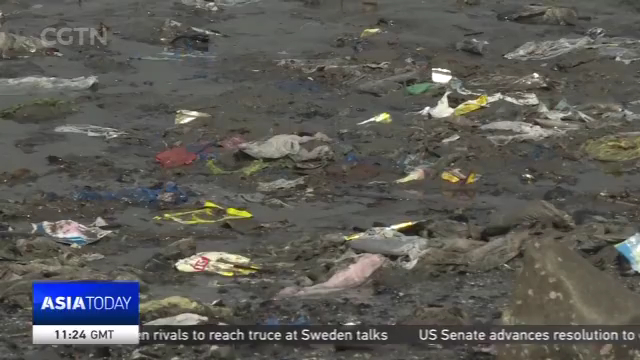
20:03, 13-Dec-2018
Social Dilemma in Philippines: Plastic sachets empower poor, but menace environment
Updated
19:38, 16-Dec-2018
02:40

Small plastic packaging known as sachets have become ubiquitous in the Philippines. They've made products otherwise unaffordable, available to poor Filipinos. But as CGTN's Barnaby Lo reports, they're also causing a massive plastic waste problem.
Since giving birth to her daughter, 27-year-old Mercy Daranda has had to stop working. That shrunk their household income. Now she has to make do with a monthly budget of 250 dollars, money her husband sends from abroad. She can't sacrifice rent and utilities, so the first to go are bottled grocery items.
MERCY DARANDA HOUSEWIFE "Let's take shampoo, for example, I now buy the small packets and we use them as sparingly as possible. Same with toothpaste because that's what we can afford."
These small packets are more popularly known as sachets in the Philippines, and they've been a lifeline for many Filipinos who can't afford to buy bigger and more expensive packaging. They're available everywhere, from supermarkets to small neighborhood stores. But they've also been a major source of plastic waste.
ABI AGUILAR GREENPEACE PHILIPPINES "In terms of affordability, yes, it's what's within reach of lower classes of the society. But if you look at it in the long run, the effects, you know, do not outweigh what is being promoted by the manufacturers."
BARNABY LO MANILA "It's fairly obvious from what you can see in my background that we are in the middle of the city. But this site, where we are on exactly right now, is called Freedom Island and it's actually a bird sanctuary and an ecotourism site as declared by the government. So there are very strict environmental guidelines here, but despite that and despite clean-up efforts, there is a perpetual trash problem here."
Much of Metro Manila's plastic waste ends up in the ocean and along coastlines. In fact, the United Nations has cited the Philippines as one of the world's top five plastic polluters. Mercy is aware of this, but she says she's left with no choice.
MERCY DARANDA HOUSEWIFE "I used to buy bottled grocery items, but with everything so expensive now, I've had to resort to sachets."
Environmentalists say the burden falls on the shoulder of manufacturers who have the financial capacity to innovate their distribution method. Barnaby Lo, CGTN, Manila.

SITEMAP
Copyright © 2018 CGTN. Beijing ICP prepared NO.16065310-3
Copyright © 2018 CGTN. Beijing ICP prepared NO.16065310-3